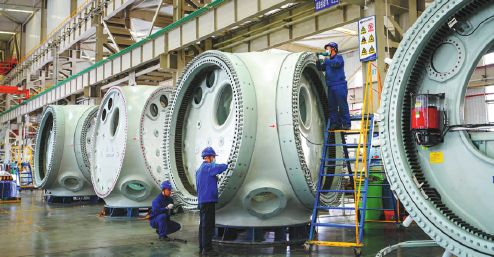Xinjiang set for more growth

Employees of a wind power equipment manufacturer in Hami, Xinjiang Uygur autonomous region, install screw bolts on wind turbines in April. Xinjiang has been stepping up efforts to improve the environment for investment and new businesses. LI HUA/FOR CHINA DAILY
Region's Party chief calls for even better environment to help businesses thrive
While the Xinjiang Uygur autonomous region has been gearing up to attract investments and businesses this year, with stability providing the region with unprecedented opportunities to boost development, businessmen are feeling the changes and becoming more confident about the region's future.
Dai Wenyi, manager of Gangzhisheng Steel Structure Co, which is based in the regional capital of Urumqi, said that he has been in a good mood since the Spring Festival holiday in February, because he has noticed the government's fresh efforts to improve the business environment and take care of local businesspeople.
"I can feel many obvious changes in Xinjiang. The measures of epidemic control and maintaining stability haven't been loosened, but they are optimized to make people's lives more convenient. Also, when local industrial and commercial administrators visit my company, they always ask about our needs and difficulties, besides conducting inspections, so they can better serve us," Dai said.
He added that many security and epidemic control check points along the highways have been integrated, making commuting and logistics in the region safer.
"The changes are small but noticeable. What's more, they have sent out strong signals that the region is making some adjustments to embrace a new development phase," Dai said. "I believe potential investors and businesspeople can all sense that."
According to the Statistics Bureau of Xinjiang, the region achieved GDP growth of 7 percent in the first quarter of this year-the highest among all the 31 provincial-level regions on the Chinese mainland.
Since Ma Xingrui, former governor of China's economic powerhouse, Guangdong province, was appointed as the Party secretary of Xinjiang in December, he has on many occasions called for a more market-oriented, law-based and international business environment to help entrepreneurs thrive in Xinjiang, according to Xinjiang Daily.
While meeting in Beijing on March 12 with representatives of centrally administered State-owned enterprises, Ma said that the region has entered an important period of high-quality economic growth, since Xinjiang's social situation has become stable and people are living contented and comfortable lives.
Ma also met with two groups of leading Chinese entrepreneurs during their tours of Xinjiang, and he promised them the region will step up efforts to improve the environment for investing and setting up new businesses, as well as offer better support and services to market entities.
Furthermore, in a rare practice in Xinjiang, the region's Party chief took part in an online lecture for Xinjiang officials on high-quality development.
This occurred on Feb 12, when Yang Xinhong, director of the Statistics Bureau of Guangdong, was invited to teach local officials how to use data analysis to support policymaking and boost development.
Zhang Xiu, chairman of Tianyun Organic Agriculture Co, which is based in the Ili Kazak autonomous prefecture, said that he has been closely following Ma's remarks on boosting economic development and the region's efforts to attract investment and businesses.
"Changes are happening in Xinjiang after safety concerns are no longer a big issue for the public and entrepreneurs. I've never felt this confident about the region's future, as its development will be on the fast track from now on," said Zhang, who has been doing business in Xinjiang for more than 28 years.
"Not a single terrorist attack has happened in Xinjiang for more than five years. It's quite an achievement," he said.
For a period of time, Xinjiang had experienced frequent terrorist attacks, which caused great harm to the lives and property of people from all ethnic groups. Since 2014, the region has stepped up efforts to root out terrorism and religious extremism.
Wang Yang, chairman of the Chinese People's Political Consultative Conference National Committee, also said during a visit to Xinjiang in March that it faces unprecedented opportunities for development.
The region needs to take full advantage of the stability and policy support when planning the development path. In addition, securing happy lives for the people of various ethnic groups in Xinjiang is a way to counter the rumors, slander and attacks from hostile forces, Wang said.
In recent years, some Western politicians and anti-China forces have accused Xinjiang of using "forced labor" and committing "genocide".As a result, a series of sanctions have been imposed by the United States and some European countries on Xinjiang-related products. The Chinese government has repeatedly said that such moves are based on lies and aim to curb Xinjiang's development to restrain China's growth.
"Those noises won't affect Chinese entrepreneurs' enthusiasm about investing in Xinjiang, because we all know that those accusations are simply not true," said Zhang, the Tianyun Organic Agriculture chairman. "Also, no one wants to miss the best time for doing business in Xinjiang."
Zhang added that the autonomous region still needs to improve the efficiency of industrial and commercial administrative services and better assist privately owned enterprises in getting loan support.
"After the business environment in Xinjiang is further improved, it will surely attract more investment and businesses," he added.
Motivated, confident
The Xinjiang Administration for Market Regulation announced in April that, to further optimize the business environment and promote fair play, it will launch a six-month campaign to tackle behavior that abuses administrative powers to interfere with market competition.
Using administrative powers to affect the flow of goods or to treat entrepreneurs from elsewhere unfairly in the key areas of healthcare, public services and government procurement will be targeted, the administration said.
During the 14th Five-Year Plan (2021-25) period, 11 centrally administered State-owned enterprises plan to carry out 38 investment projects in Xinjiang. The total investment is expected to reach 611.7 billion yuan ($90.1 billion), according to cooperation agreements that the regional government signed with the SOEs in March.
In addition, according to the Department of Commerce of Xinjiang, during the first quarter of the year, the region attracted more than 57.97 billion yuan of investment from outside the region-an increase of more than 51 percent year-on-year. More than 80 percent of the investments were from the private sector.
While resource-rich Xinjiang's competitive energy sector of petrochemicals, coal and coal chemicals has continued to attract large investment from outside, the investment in the region's biochemical and new material sector in the first three months of the year increased more than fourfold year-on-year. Furthermore, the region's cultural and tourism sector has attracted an investment of about 2.4 billion yuan, an increase of more than 64.5 percent year-on-year, according to the department.
Abdulkayum Salam, a professor of economics at the Party School of the Communist Party of China's Xinjiang Committee, said the news about new investments has become the talk of the region.
"Measures to improve the business environment have made Xinjiang people more motivated. Furthermore, they are more confident about Xinjiang's future," Abdulkayum said.
While focusing on development, Xinjiang will continue to enforce measures to fight terrorism and extremism.
Ma, the Party chief of Xinjiang, said in an article published in People's Daily on April 21 that the region will continue to strike hard at crimes related to terrorism and extremism and will resolutely prevent the occurrence of major terrorist attacks.
Xu Guixiang, a spokesman for the regional government, said that there is still a lot to be done to eradicate the sources of terrorism and extremism.
"People may notice that some of the facilities for the purpose of maintaining stability in Xinjiang have been optimized for the convenience of the public and businesses after the social situation has become stable. However, it doesn't mean we have let our guard down," he said.
Photos
Related Stories
- Experts denounce U.S. plot to deprive Xinjiang people of development opportunities
- Video conference held to share festive experience in Xinjiang
- Sea of wild tulips adorn the shore of Sayram Lake in NW China's Xinjiang
- Traditional field hockey sport in NW China's Xinjiang passed down to younger generations
- Secret of longevity in Keping County, Xinjiang
Copyright © 2022 People's Daily Online. All Rights Reserved.










